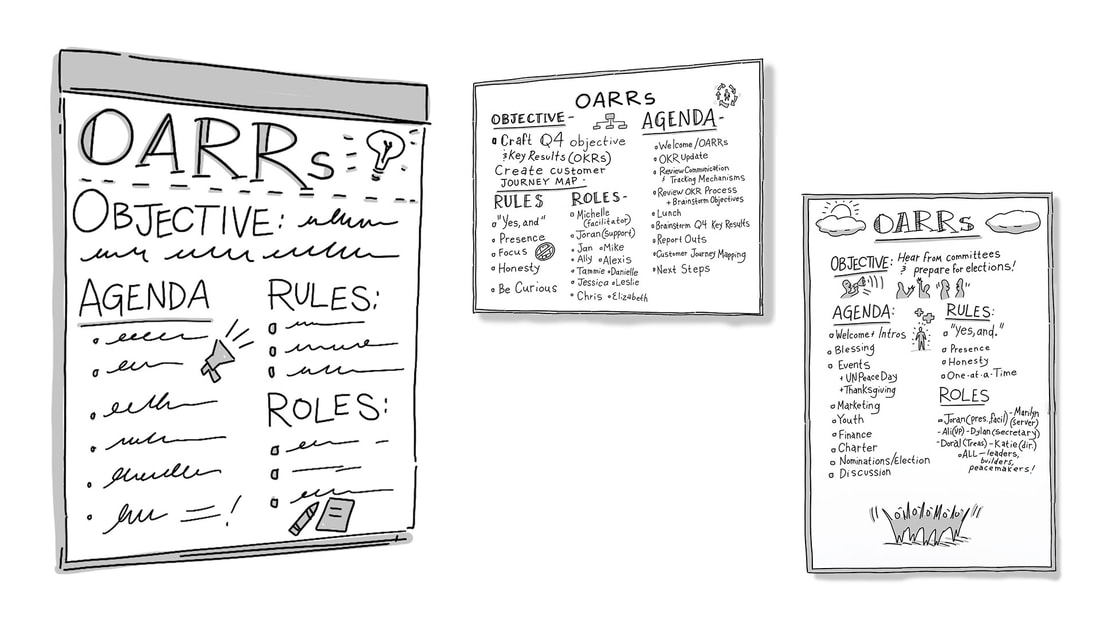|
We use four key questions to create great meetings. They are called the OARRs (Objective, Agenda, Rules and Roles) and are inspired by our work with The Grove Consultants International.
The OARRs are a sure-fire way to identify your primary objective (“What do we hope to achieve?”), articulate your agenda (“What must we do today?”), get clear on team roles (“Who needs to be in the room and what are they doing?”) and establish some ground rules (“What behaviors do we need to set and reinforce so that we may follow the agenda and achieve our objective?”). 1. What is the Objective for the meeting? Is the meeting to make a decision, share knowledge, explore ideas, or address a challenge? The objective will determine who needs to be there, the length of the meeting, and the right time of day for the meeting. You don’t hold a brainstorming meeting directly after lunch, when the team is full and sluggish. Those meetings are best in the morning when (most) people are open-minded, fresh, and creative. 2. What is the Agenda? To keep everyone focused and to determine the duration of the meeting, you’ll need an agenda. This is a list of all of the business you need to cover or all the decisions you need to make. Consider using a Visual Agenda — either a set of boxes sized according to how much time is spent on each or a Pie Chart Agenda. There are always at least three components to every agenda:
3. What are Our Roles? Based on the Objective and the Agenda, determine who needs to be in the meeting and what their roles are. Roles can be based on a participant’s job description, their expertise, their knowledge of the problem and the marketplace, or their position as a producer or stakeholder. You may assign some roles to people at the outset of the meeting. Who is transcribing or taking notes? Who is acting as a facilitator? Who is keeping track of time and making sure lunch gets ordered? Who is the designated “Devil’s Advocate” — acting as the wrangler of unicorns and asking tough questions about how we might fail? It helps to think about these roles metaphorically. Are you the person driving, coaching, cheerleading, building, etc.? See also: The Five Vital Roles in Any Virtual Meeting 4. What are the Rules? Rules help us cross the finish line as a team. Rules are the covenant and the contract that we abide by as a community. We establish affinity, trust and relationship by mutually agreeing on and following the rules. If your meeting is being held to reach a decision, then your rules need to create a process of decision-making. You might have a rule about deferring new ideas, projects or business to a later date. You might have a rule about withholding judgment, instead asking specific questions that help you arrive at a decision. If you’re establishing an environment of trust, respect, consensus and collaboration, you might have rules about always speaking for yourself (using “I” language), raising your hand, or speaking one-at-a-time. If the meeting is exploratory — designed to share knowledge or brainstorm big, wild ideas — then the rules must support creativity and openness. We borrowed one of the most effective rules for generativity from improv comedy: “Yes, and …” See also: The Power of "Yes, and ..." By invoking the rule of “Yes, and …” we stay positive and build on each other’s thoughts, honoring what everyone has to say. Problem-solving meetings may include the rules “All information is valuable” or “No idea is too small.” You may invoke “Honesty” as a rule, reminding everyone that we will only achieve our goals if we trust one another and respect each other enough to tell the truth. If you don’t want people on their phones or laptops, then invoke the rule of “Focus,” “Presence,” or “All In.” Kindly instruct them that if they need to handle business they can take it out of the room (or turn off their cameras) and return when they’re done. If it’s to be a highly-visual meeting with lots of people sketching or scribing, you may add the rule, “Don’t make fun of others’ drawings.” After reviewing the rules, you may ask, “Are there any rules we forgot?” Allowing the participants to create rules together is a way to ensure commitment and engagement early in the process.
0 Comments
Your comment will be posted after it is approved.
Leave a Reply. |
Details
ABOUT THE AuthorJoran Slane Oppelt is an international speaker, author and consultant with certifications in coaching, storytelling, design thinking and virtual facilitation. Archives
March 2024
Categories
All
|


 RSS Feed
RSS Feed